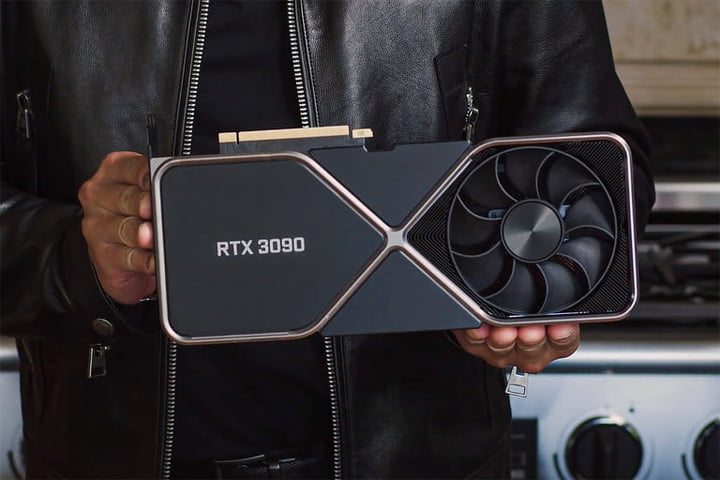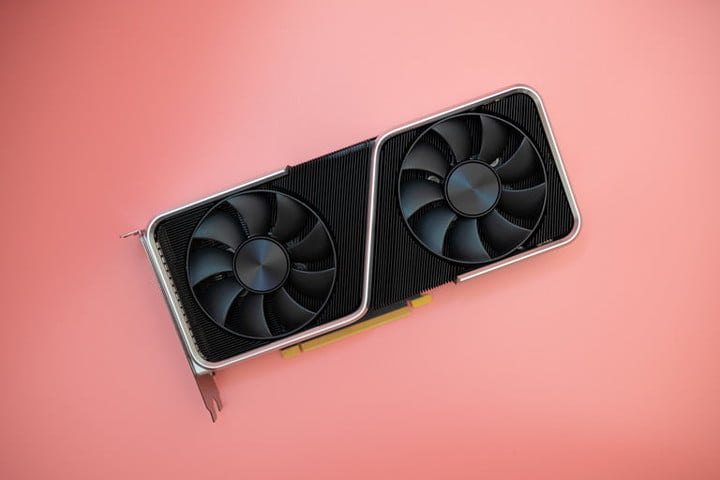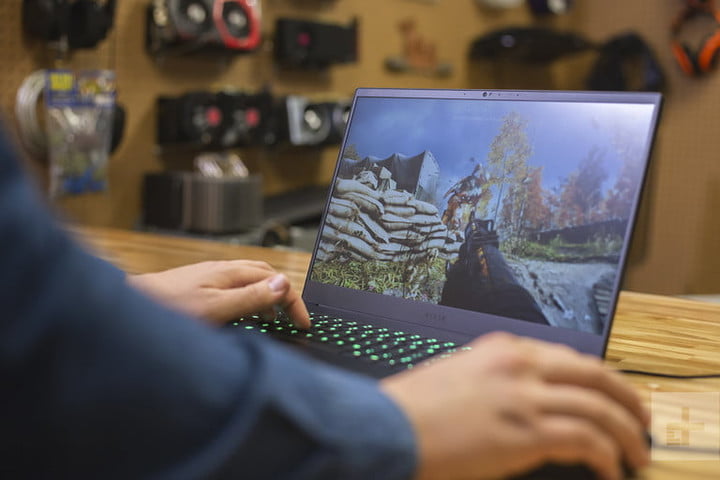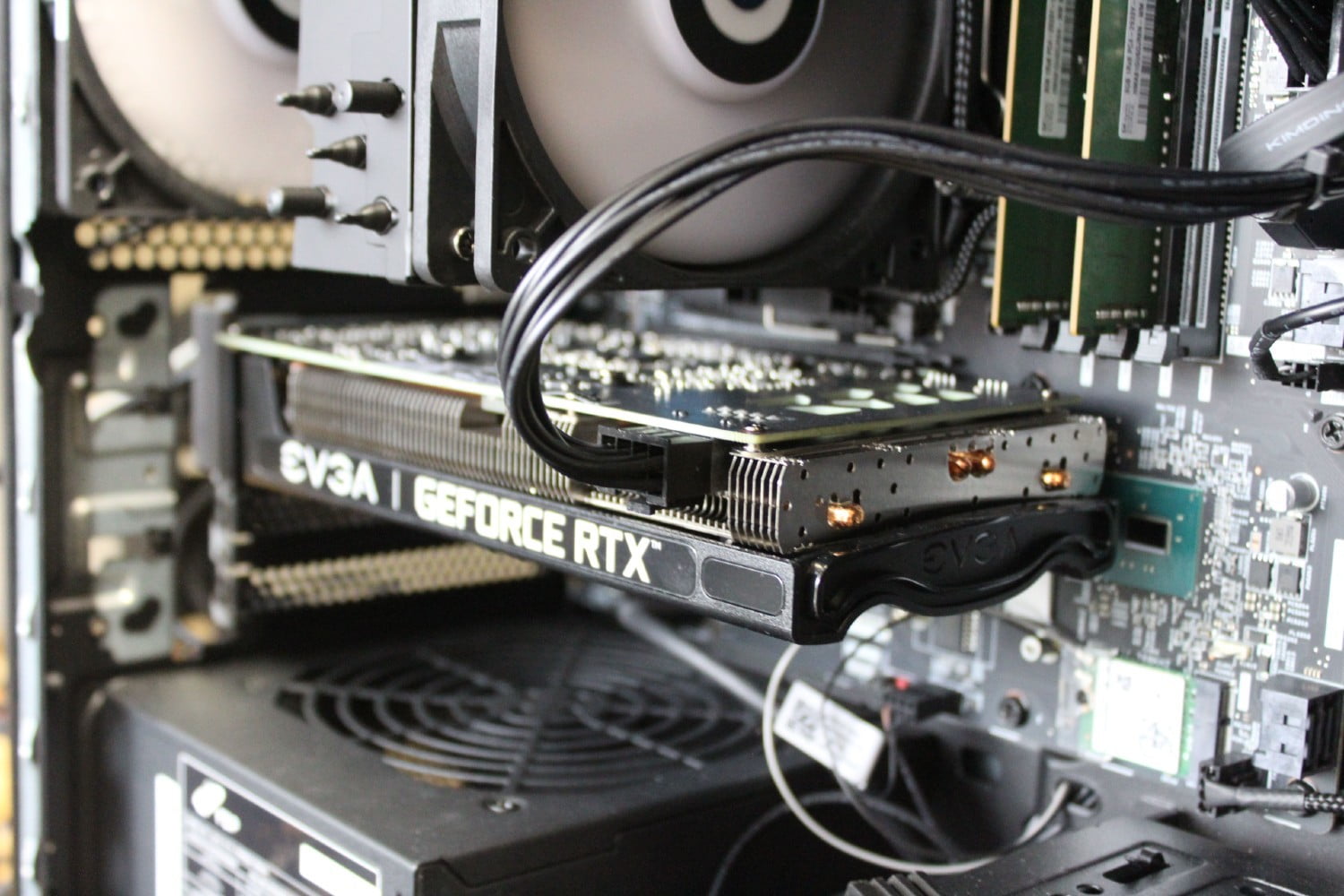The latest graphics cards from AMD and Nvidia aren’t brand new, but they’re still the best graphics cards you can buy. In 2021, there are multiple options for 4K, 1440p, and 1080p gamers, each of which delivers high frame rates in the latest AAA games — should you score a GPU at a reasonable price, that is.
Although not the newest of the bunch, the highly coveted Nvidia RTX 3080 is still our go-to recommendation in 2021. That said, AMD’s Radeon RX 6000 cards offer some tough competition.
We can’t ignore the elephant that’s been in the room for over a year. The GPU shortage is still in full swing, making it impossible to buy nearly any graphics card, let alone one of the best ones. We don’t want to recommend an overpriced, underpowered graphic card, so let our ranking serve as a shortlist should you get lucky when buying a graphics card.
The best graphics cards at a glance
Nvidia GeForce RTX 3080
Why should you buy this: Although almost half the price of the 3090, Nvidia’s 3080 delivers near-comparable performance at 4K.
Who’s it for: Gamers with a 4K display who want to play the latest AAA games at high frame rates.
Why we picked the Nvidia GeForce RTX 3080:
The RTX 3080 is best suited for the 4K gamer who doesn’t want to compromise. It outpaces last gen’s RTX 2080 Ti by a significant margin while launching at about half of the price. It can maintain above 60 frames per second for 4K gaming in titles like Assassin’s Creed Odyssey, offering smooth gameplay in even the most demanding games.
Its features shouldn’t go unnoticed, either. This Nvidia graphics card comes packed with the latest ray-tracing cores for accurate gaming lighting, and you can leverage the Tensor cores for dynamic upscaling through Nvidia Deep Learning Super Sampling (DLSS). The RTX 3080 offers enough performance to warrant a purchase, and these two features push it over the edge.
The Nvidia RTX 3080 is the best graphics card for 4K gaming. It hits a sweet spot in the high-end market, delivering enough power to handle the most demanding AAA titles without bogging down the card with extra memory that isn’t useful for the majority of gamers. The RTX 3080 is a true gamer’s graphics card, and it’s the go-to option in 2021.
Nvidia GeForce RTX 3070
Why should you buy this: The RTX 3070 is the sweet spot in Nvidia’s current line-up, offering up enough power to push some games to 4K without the price of an RTX 3080.
Who’s it for: The mainstream PC gamer that wants a lot of power at a reasonable price.
Why we picked the Nvidia GeForce RTX 3070:
Although the RTX 3080 represents the best bang for your buck in Nvidia’s current line-up, the RTX 3070 isn’t far behind. It’s a 1440p monster, allowing you to take advantage of high refresh rate displays with ease. It can push some games to 4K, too, though you might struggle to maintain 60 fps in games like Assassin’s Creed Valhalla with max settings.
For more reasonable games, the RTX 3070 is a monster. It can blow past 60 fps at 4K in games like Fortnite and Battlefield V, all while clocking in significantly less pricey than the RTX 3080. It’s a graphics card for the PC gamer that’s willing to compromise in a few demanding games to save some money.
Why not the newer RTX 3070 Ti? Well, the RTX 3070 represents a better value. On average, we found about an 8% improvement with the Ti model in our RTX 3070 Ti review. That’s not bad for a $100 premium, but the RTX 3080 represents a 14% increase over the RTX 3070 Ti. Because of that, we recommend sticking with one of the non-Ti models.
Nvidia GeForce RTX 3090

Why should you buy this: The RTX 3090 is a monster of a graphics card, featuring Titan-esque performance at a (comparably) affordable price.
Who’s it for: PC enthusiasts who want the best of the best and have the budget to buy it.
Why we picked the Nvidia GeForce RTX 3090:
Nvidia went a different route with its 30-series GPUs, replacing last gen’s Titan RTX with the RTX 3090 (that’s what we found, at least, in our RTX 3080 versus 3090 comparison). It’s a monster GPU, sporting 24GB of GDDR6X memory, a massive 10,496 CUDA cores, and a boost clock of 1.7GHz. If you want the best of the best and don’t mind paying for it, the RTX 3090 is best suited for you.
You should only buy the RTX 3090 if you can take advantage of its massive amount of memory, though. The RTX 3080 Ti is almost identical in 4K gaming performance. The best case for the RTX 3090 is if you use it for gaming with some productivity tasks on the side. It can shred rendering and 3D animation tasks, as well as CAD programs.
If you prefer Team Red, the RX 6900 XT is a great alternative to the RTX 3090. The 6900 XT actually holds the GPU overclocking world record, and AMD recently introduced a liquid-cooled version that runs even faster than the base model. That said, the RTX 3090 comes with features like DLSS and ray tracing.
Just don’t buy the GeForce RTX 3090 hoping to slot it into an external GPU enclosure. It’s a monster of a graphics card that will make even larger cases feel small.
Nvidia GeForce RTX 3060 Ti

Why should you buy this: The RTX 3060 Ti punches well above its weight class.
Who’s it for: 1440p gamers who want all of the visual bells and whistles.
Why we picked the Nvidia GeForce RTX 3060 Ti:
The RTX 3060 Ti is an extremely powerful graphics card, considering its spot in Nvidia’s Ampere gaming lineup. Below the RTX 3070, the 3060 Ti still delivers 8GB of GDDR6 memory on a 256-bit bus and features only a slight reduction in clock speed — 1.67GHz on the 3060 Ti versus 1.72GHz on the 3070. It’s best suited for 1440p gamers that want high frame rates without the high price.
In benchmarks, the RTX 3060 Ti scores above last gen’s RTX 2080 Super. The card can deliver above 70 fps in demanding titles like Red Dead Redemption 2 with Ultra settings at 1440p. In games like Control, you can take advantage of features like DLSS to boost your performance, too.
The RTX 3060 Ti shines as the best graphics card for 1440p. It’s incredibly capable, offering frame rates north of 60 fps in demanding AAA titles, even with all the sliders turned up. Ray tracing would normally be a problem for a card like this, but thanks to DLSS, you can still hit performance marks with all the visual bells and whistles.
AMD Radeon RX 6600 XT
Why should you buy this: It’s the best 1080p gaming graphics card around, and secondhand models are cheaper than the Nvidia RTX 3060.
Who’s it for: The 1080p gamer with a high refresh rate display.
Why we picked the AMD Radeon RX 6600 XT:
The AMD Radeon RX 6600 XT isn’t great value — but in a time when GPU options are so overpriced, that hardly matters. What matters for the RX 6600 XT is that it outperforms Nvidia’s RTX 3060 by a decent margin, and on the secondhand market, it’s as much as $150 cheaper.
In an average of five gaming benchmarks, the RX 6600 XT offered about an 11% improvement over the RTX 3060 at 1080p. Across our benchmarks, it averaged 117.6 fps, making it an ideal option for 1080p gamers with a high refresh rate display. It’s simply one of the best 1080p graphics cards you buy right now.
Even in a game as demanding as Cyberpunk 2077, the Radeon RX 6600 XT can put up above 60 fps with all of the sliders turned up. Except for ray tracing, of course, which remains one of the most demanding gaming tasks for a graphics card. The RX 6600 XT doesn’t handle ray tracing as well as its Nvidia counterpart, but neither card is really cut out for it.
AMD Radeon RX 6800 XT
Why should you buy this: The RX 6800 XT is as powerful as the RTX 3080, and even more powerful if you overclock it.
Who’s it for: AMD fans who are interested in overclocking.
Why we picked the AMD Radeon RX 6800 XT:
The Radeon RX 6800 XT is AMD’s answer to the RTX 3080. It’s positioned to compete directly with Nvidia’s flagship card, but it’s packed with wildly different specs. The most interesting spec is 16GB of GDDR6 memory. Nvidia’s card uses faster memory, but AMD’s card offers more. You should buy this card if you want to play in 4K but don’t want the price tag of an Nvidia GPU.
For performance, the Radeon RX 6800 XT matches the RTX 3080 in most titles with ray tracing turned off. If you’re willing to overclock your graphics card, the 6800 XT actually edges ahead. AMD’s Infinity Cache that shows up on the RX 6800 XT allows the card to hit very high clock speeds, resulting in serious performance gains. It’s best suited for gamers who don’t care about ray tracing, though.
Ray tracing changes things a bit, as DLSS adds a huge boost in performance to Nvidia cards. That said, AMD introduced the Super Resolution feature as part of the FidelityFX suite, which is similar to DLSS. The suite also includes a variety of other visual enhancements, such as Contrast Adaptive Sharpening, which restores sharpness to an image after temporal anti-aliasing is applied. The Radeon RX 6800 XT can take advantage of all the FidelityFX features.
Nvidia GeForce GTX 1660 Super
Why should you buy this: The GTX 1660 Super can still hold up today, even with how far graphics cards have come.
Who’s it for: 1080p gamers looking for a bargain.
Why we picked the Nvidia GeForce GTX 1660 Super:
The Nvidia GeForce GTX 1660 Super looks quaint compared to the Ampere cards of today, but don’t underestimate it. The Nvidia GTX 1660 Super is the best budget GPU option in 2021. It performs excellently at 1080p, delivering a frame rate above 30 fps in highly demanding games like Metro Exodus. If you’re willing to turn down a few settings, you can hit much higher frame rates.
Although the GTX 1660 Super can hold up in the games releasing today, it can’t use visual features like ray tracing. The card isn’t an RTX card like the other Nvidia options on this list, so it doesn’t come with dedicated ray-tracing cores or support for features like DLSS. Still, for a budget option that can annihilate most games at 1080p, it’s hard arguing with the GTX 1660 Super. Don’t get tripped up by the PCIe version or other specs, either. The GTX 1660 Super is a fine fit for a modern gaming PC.
We recommend sticking with the GTX 1660 Super. The GeForce GTX 1650 is close in the lineup, but it’s far off in terms of performance. The Nvidia GTX 1660 Super is above the minimum specs for the Oculus Rift S, too, so it’s a great option if you’re interested in VR gaming.
Nvidia GeForce RTX 3060 mobile

Why should you buy this: It offers great performance without adding undue bulk to modern laptops.
Who’s it for: Power gamers on the move.
Why we picked the Nvidia GeForce RTX 3060 mobile:
Nvidia’s RTX 3060 is the latest iteration of its leaner mobile gaming solutions, but that doesn’t mean it lacks power. It offers a greater number of CUDA cores than previous generations of Nvidia mobile chips and delivers a sizable performance improvement over the past generation.
Although the RTX 3060 falls behind its full-scale desktop and mobile counterparts, its real strength lies in not outputting anywhere near the level of heat generated by big-scale GPUs. That means you’ll still find the RTX 3060 in laptops that are sleek and thin and don’t weigh too much. You can see the results in this older Razer Blade that we previously used in testing that weighs just 4.5 pounds and offers performance that in years gone by you’d only find in chunky gaming machines that weigh close to double that.
There are some solid alternatives in this space, with both AMD and Nvidia offering mobile options with greater and lesser performance depending on your needs. In our opinion, RTX 2070 Max-Q offers all the performance most users could want, all in a low-profile chipset. It’s a great solution for those who want optimal video performance from a smaller laptop. If you’re a gamer or just want some enhanced graphics on your small form factor laptop, this is a great choice.
Questions about the best graphics cards
How do you know which graphics card will best suit your needs?
Finding the graphics card that will best suit your needs comes down to the resolution of your display and the kinds of games you play. The Nvidia GeForce RTX 3080 is great for 4K, for example, but it’s overkill for 1080p where the AMD Radeon RX 6600 XT shines. The lower your display’s resolution, the less you need to spend on a graphics card.
Beyond that, consider the games you want to play and at what frame rates. You can use the Nvidia GeForce GTX 1660 Super for everything from Counter-Strike: Global Offensive to Borderlands 3, but you might need to step up to the GeForce RTX 3070 to play games like Assassin’s Creed Valhalla.
How much should you spend on a graphics card?
As a rule of thumb, you should dedicate about 30% of your budget to a graphics card for a gaming PC. For 1080p, you should spend around $300 to $400; for 1440p, around $400 to $500; and for 4K, $600 or above. The Radeon RX 6600 XT targets 1080p at $379, the GeForce RTX 3070 is great for 1440p at $500, and the GeForce RTX 3080 is the perfect video card for 4K at $700.
Graphics cards are vastly overpriced in 2021, though. As it stands now, you can expect to pay double what you should for each resolution. Hopefully, that will change in the coming months.
How can you find the right power supply for a graphics card?
Nvidia and AMD recommend power supply wattage for their most recent graphics card. The Radeon RX 6800 XT, for example, draws 300W of power and AMD recommends a 750W PSU at least. Similarly, the GeForce RTX 3080 video card draws 320W and Nvidia recommends a 750W PSU. These recommendations aren’t always perfect, though, so we recommend using a PSU calculator.
